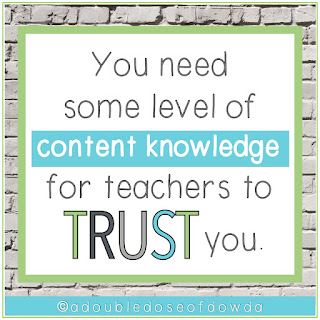Know your content knowledge.
As an instructional coach, I believe you need at least a little bit of content knowledge that relates to the teachers you are working with.What to look for in this post:
- Strategies versus content knowledge
- Tips for decreasing overwhelm related to content knowledge
If you prefer to hear me talk through this, here are two videos featuring all of this content:
Strategies Versus Content Knowledge
When I first interviewed for an instructional coach position, they asked about strategies I would use. The position was for K-12 math, so I listed a couple of strategies but also told them I would need to make sure I revisited math content. It had been a while since I had done calculus and algebra.The interviewer told me to focus on strategies. They told me that the content did not matter, and that I could coach teachers without knowing the content. In that moment, I decided that I disagreed with that statement. I have now been coaching for over six years, and I still disagree.
To be an effective instructional coach, I believe you have to have some content knowledge. You definitely do not have to have all the content knowledge, and you can continue to learn as you go along as well. Oftentimes, however, especially when it comes to high school, I think you need some content knowledge in order to successfully coach those teachers. You can lean on them for the details, but they have to see you as somewhat knowledgeable if they are going to trust you and buy into what you are saying as an instructional coach.
Tips for Decreasing Overwhelm Related to Content Knowledge
It can feel overwhelming to try to gain content knowledge in several areas. I know this from personal experience as an elementary teacher moving to a high school situation.My first tip is to be kind to yourself and understand that you are not going to be able to do it all in your first year or two. Start small, and pick one or two subject areas that you can really dig into.
My second tip is to get into the classrooms when you are coaching with PLCs or teams. This is helpful in general, but especially so if you are new to that subject area. Classroom visits can help you to learn the content as a student would.
Be kind to yourself, and know that you cannot do it all at once.
Check out these related posts:
Responding to Teachers’ Concerns and Complaints as an Instructional Coach
Tips for Talking to Teachers as an Instructional Coach
Building Trust with Teams as an Instructional Coach
Check out these related YouTube videos:
Take Your Time to Respond to Teachers
Friendly Reminder: Don’t “Should” On Your Teachers
Building Trust with Instructional Coaches



No comments
Post a Comment